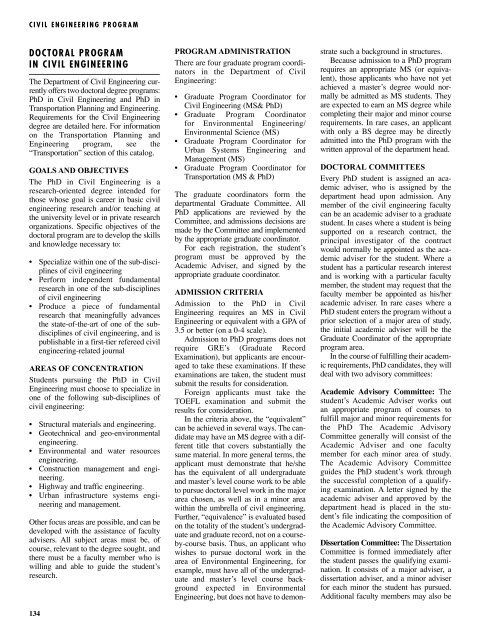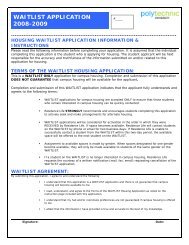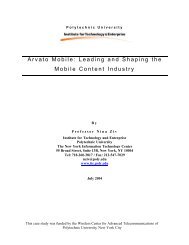POLYTECHNIC UNIVERSITY 2005-2007
POLYTECHNIC UNIVERSITY 2005-2007
POLYTECHNIC UNIVERSITY 2005-2007
You also want an ePaper? Increase the reach of your titles
YUMPU automatically turns print PDFs into web optimized ePapers that Google loves.
CIVIL ENGINEERING PROGRAM<br />
DOCTORAL PROGRAM<br />
IN CIVIL ENGINEERING<br />
The Department of Civil Engineering currently<br />
offers two doctoral degree programs:<br />
PhD in Civil Engineering and PhD in<br />
Transportation Planning and Engineering.<br />
Requirements for the Civil Engineering<br />
degree are detailed here. For information<br />
on the Transportation Planning and<br />
Engineering program, see the<br />
“Transportation” section of this catalog.<br />
GOALS AND OBJECTIVES<br />
The PhD in Civil Engineering is a<br />
research-oriented degree intended for<br />
those whose goal is career in basic civil<br />
engineering research and/or teaching at<br />
the university level or in private research<br />
organizations. Specific objectives of the<br />
doctoral program are to develop the skills<br />
and knowledge necessary to:<br />
• Specialize within one of the sub-disciplines<br />
of civil engineering<br />
• Perform independent fundamental<br />
research in one of the sub-disciplines<br />
of civil engineering<br />
• Produce a piece of fundamental<br />
research that meaningfully advances<br />
the state-of-the-art of one of the subdisciplines<br />
of civil engineering, and is<br />
publishable in a first-tier refereed civil<br />
engineering-related journal<br />
AREAS OF CONCENTRATION<br />
Students pursuing the PhD in Civil<br />
Engineering must choose to specialize in<br />
one of the following sub-disciplines of<br />
civil engineering:<br />
• Structural materials and engineering.<br />
• Geotechnical and geo-environmental<br />
engineering.<br />
• Environmental and water resources<br />
engineering.<br />
• Construction management and engineering.<br />
• Highway and traffic engineering.<br />
• Urban infrastructure systems engineering<br />
and management.<br />
Other focus areas are possible, and can be<br />
developed with the assistance of faculty<br />
advisers. All subject areas must be, of<br />
course, relevant to the degree sought, and<br />
there must be a faculty member who is<br />
willing and able to guide the student’s<br />
research.<br />
134<br />
PROGRAM ADMINISTRATION<br />
There are four graduate program coordinators<br />
in the Department of Civil<br />
Engineering:<br />
• Graduate Program Coordinator for<br />
Civil Engineering (MS& PhD)<br />
• Graduate Program Coordinator<br />
for Environmental Engineering/<br />
Environmental Science (MS)<br />
• Graduate Program Coordinator for<br />
Urban Systems Engineering and<br />
Management (MS)<br />
• Graduate Program Coordinator for<br />
Transportation (MS & PhD)<br />
The graduate coordinators form the<br />
departmental Graduate Committee. All<br />
PhD applications are reviewed by the<br />
Committee, and admissions decisions are<br />
made by the Committee and implemented<br />
by the appropriate graduate coordinator.<br />
For each registration, the student’s<br />
program must be approved by the<br />
Academic Adviser, and signed by the<br />
appropriate graduate coordinator.<br />
ADMISSION CRITERIA<br />
Admission to the PhD in Civil<br />
Engineering requires an MS in Civil<br />
Engineering or equivalent with a GPA of<br />
3.5 or better (on a 0-4 scale).<br />
Admission to PhD programs does not<br />
require GRE’s (Graduate Record<br />
Examination), but applicants are encouraged<br />
to take these examinations. If these<br />
examinations are taken, the student must<br />
submit the results for consideration.<br />
Foreign applicants must take the<br />
TOEFL examination and submit the<br />
results for consideration.<br />
In the criteria above, the “equivalent”<br />
can be achieved in several ways. The candidate<br />
may have an MS degree with a different<br />
title that covers substantially the<br />
same material. In more general terms, the<br />
applicant must demonstrate that he/she<br />
has the equivalent of all undergraduate<br />
and master’s level course work to be able<br />
to pursue doctoral level work in the major<br />
area chosen, as well as in a minor area<br />
within the umbrella of civil engineering.<br />
Further, “equivalence” is evaluated based<br />
on the totality of the student’s undergraduate<br />
and graduate record, not on a courseby-course<br />
basis. Thus, an applicant who<br />
wishes to pursue doctoral work in the<br />
area of Environmental Engineering, for<br />
example, must have all of the undergraduate<br />
and master’s level course background<br />
expected in Environmental<br />
Engineering, but does not have to demonstrate<br />
such a background in structures.<br />
Because admission to a PhD program<br />
requires an appropriate MS (or equivalent),<br />
those applicants who have not yet<br />
achieved a master’s degree would normally<br />
be admitted as MS students. They<br />
are expected to earn an MS degree while<br />
completing their major and minor course<br />
requirements. In rare cases, an applicant<br />
with only a BS degree may be directly<br />
admitted into the PhD program with the<br />
written approval of the department head.<br />
DOCTORAL COMMITTEES<br />
Every PhD student is assigned an academic<br />
adviser, who is assigned by the<br />
department head upon admission. Any<br />
member of the civil engineering faculty<br />
can be an academic adviser to a graduate<br />
student. In cases where a student is being<br />
supported on a research contract, the<br />
principal investigator of the contract<br />
would normally be appointed as the academic<br />
adviser for the student. Where a<br />
student has a particular research interest<br />
and is working with a particular faculty<br />
member, the student may request that the<br />
faculty member be appointed as his/her<br />
academic adviser. In rare cases where a<br />
PhD student enters the program without a<br />
prior selection of a major area of study,<br />
the initial academic adviser will be the<br />
Graduate Coordinator of the appropriate<br />
program area.<br />
In the course of fulfilling their academic<br />
requirements, PhD candidates, they will<br />
deal with two advisory committees:<br />
Academic Advisory Committee: The<br />
student’s Academic Adviser works out<br />
an appropriate program of courses to<br />
fulfill major and minor requirements for<br />
the PhD The Academic Advisory<br />
Committee generally will consist of the<br />
Academic Adviser and one faculty<br />
member for each minor area of study.<br />
The Academic Advisory Committee<br />
guides the PhD student’s work through<br />
the successful completion of a qualifying<br />
examination. A letter signed by the<br />
academic adviser and approved by the<br />
department head is placed in the student’s<br />
file indicating the composition of<br />
the Academic Advisory Committee.<br />
Dissertation Committee: The Dissertation<br />
Committee is formed immediately after<br />
the student passes the qualifying examination.<br />
It consists of a major adviser, a<br />
dissertation adviser, and a minor adviser<br />
for each minor the student has pursued.<br />
Additional faculty members may also be




